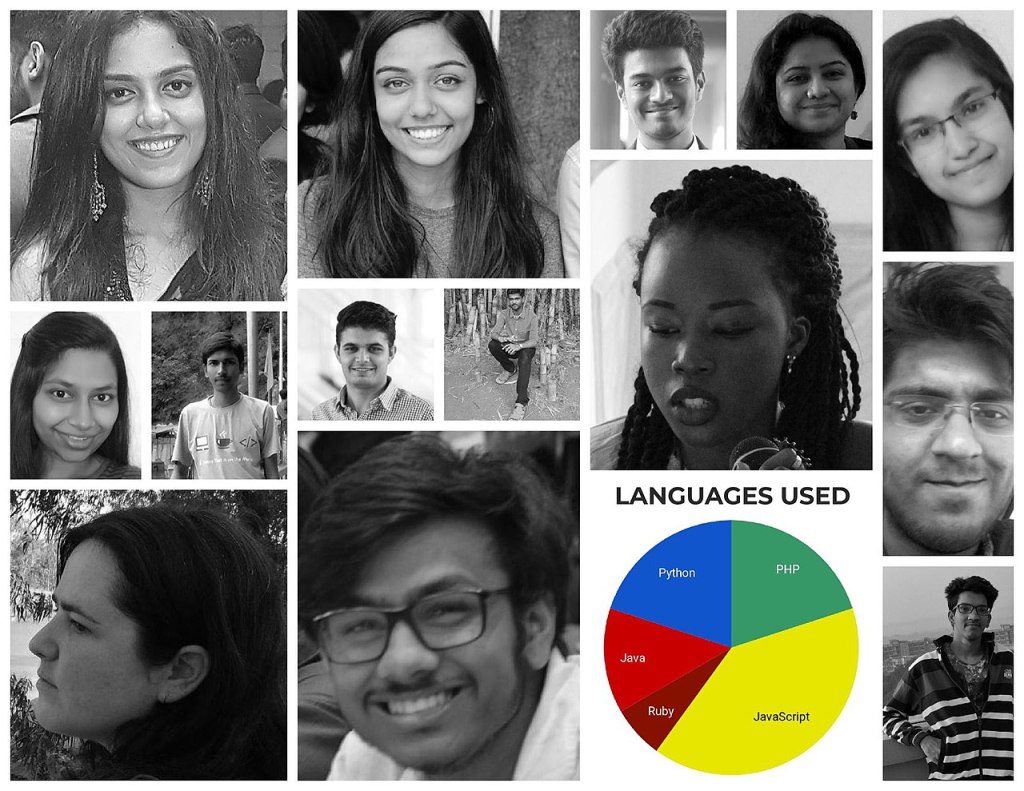Fifteen students from India, Israel, and Cameroon contributed over fifty thousand lines of code to Wikimedia projects this past summer* under the mentorship and guidance of twenty-four mentors. Thirteen of those projects were conducted under the Google Summer of Code program, and one was managed under the Outreachy program. In addition, one student completed a project without being granted a slot through Google Summer of Code.
Both programs, which are sponsored by Google and the Software Freedom Conservancy (respectively), are designed to introduce university students to free and open-source software projects. Wikimedia, which has participated in GSoC programs for thirteen years and the Outreachy program for six, mentors student developers from around the world throughout the summer. In return, students contribute thousands of lines of code to Wikimedia projects, obtain a deeper understanding of our movement, write about their experiences on a weekly basis, and connect with Wikimedia developers all over the world.
Combined, these fifteen students produced more than 53,000 new lines, of which 52,143 new lines are merged and already deployed providing users with new functionality. Four of these projects resulted in a new repository, and many were entirely new tools or components inside existing repositories. Besides, some students will be continuing the work on getting their work-in-progress patches merged that were waiting on some dependencies earlier.
Two students detailed their learnings and experiences on bi-weekly Medium posts:
Below are links to the projects that students developed:
- Emoji Twitter bot for Commons images from NYPL fork, Rosalie Perside
- Feedback on how pictures uploaded to Commons get used: statistics, barnstars, light gamification, Tanvi Dadu
- Add a spreadsheet interface for modifying multiple pages to the Page Forms extension, Yashdeep Thorat
- WikiEducation Dashboard Article Finder Tool, Pratyush Singhal
- [#1Lib1Ref] Build a “worklist” tool for campaigns and in-person editing events, Megha Sharma
- Browse feature for Wikimedia Commons app, Ujjwal Agrawal
- OOUI Tutorial Migration, Hagar Shilo
- Improve the Cargo Special:Drilldown page, Nikhil Kumar
- Improve Data Explorer on query.wikidata.org, Prssanna Desai
- [Analytics] Improvements to Wikistats 2.0 front-end, Sahil Khokhar
- Improvements for the Toolforge ‘webservice’ command, Neha Jha
- Predict relevance of search results from historical clicks using a Neural Click Model, Karan Dhingra
- Fraud Detection Tool for Fundraising, Saurabh Batra (Completed under CiviCRM organization)
- Improve support for photo/media contribution campaigns on Wikimedia Programs & Events Dashboard, Urvashi Verma (Outreachy candidate)
- Wikipedia Facebook Chatbot, Balaji Ramasubramanian (Independent)
We tried a new thing this year! Many candidates put a lot of effort into their proposals, and there are many reasons why we may not be able to select a candidate for a project. This year we sent an email to the 50 students who we didn’t accept an offering to de-brief them on why their proposal was not accepted and provide suggestions for improvement to keep in mind while applying for the next round. We also mentioned to these candidates that if they still wanted to do their project alongside (but outside) GSoC, we can help them with that. We were happy to see that as a result of this effort Balaji (number 14 on the project list above) felt motivated to keep going with the proposal they had put so much thought into, creating a brand new category of student project: Independent.
Three Wikimedia members Feroz Ahmad, Jonas Kress, and Andre Klapper will be attending the mentor summit at Google HQ in October.
Keep an eye on our Outreach programs page to learn about the opening of the application period for Outreachy Round 17!
Thanks to all our mentors for their tremendous efforts in helping students unleash their full potential: Moriel, Roan, Volker, Trey, Guilherme, Andrew, Yaron, Feroz, Alangi, Sage, Jonathan, Stanislav, Lucas, Jonas, Ariel, Dereckson, Marcel, Vivek, Josephine, Neslihan, Nicolas, Nischay, Adam, and Eileen.)
John Vandenberg, Wikimedia community member
Srishti Sethi, Developer Advocate, Technical Engagement, Wikimedia Foundation
*In the Northern Hemisphere.
This post was modified to add a fifteenth project (listed at #13 above), which was inadvertently left off.

Can you help us translate this article?
In order for this article to reach as many people as possible we would like your help. Can you translate this article to get the message out?
Start translation
